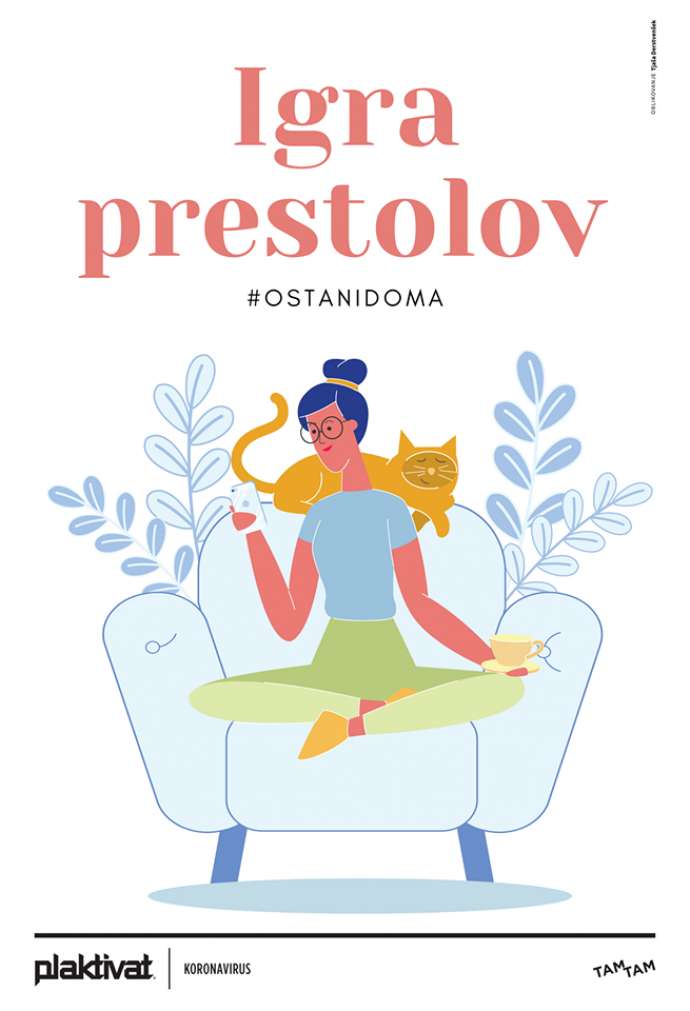All our stories on coronavirus are here, while those covering covid-19 and Croatia are here. We'll have an update at the end of the day, and if you want newsflashes then we'll post those on Facebook
We can’t have pictures of COVID-19 every day. So instead we’ll try and show the works of Slovenian artists. Today it’s Tjaša Derstvenšek, from the agency Pristop. You can see more of thois series of posters Contents
Extended police powers to be thrown out of anti-coronavirus legislation
No major violations of stricter movement rules
Disadvantaged students to get equipment for online classes
Govt Drops Plans to Expand Police Powers
STA, 1 April 2020 - The coalition has backtracked somewhat the decision to extend the powers of the police force for the purpose of controlling the Covid-19 epidemic. Amendments filed by the coalition on Wednesday strike out the possibility of the police to track people in quarantine without a court warrant, create photo robots and enter apartments.
The coalition decided against allowing this after experts and lay public expressed concerns. Information Commissioner Mojca Prelesnik said yesterday that this would in effect amount to Slovenia becoming a police state.
Echoing the view of several opposition parties, Prelesnik moreover said it was inappropriate for additional police powers to be put in the same legislative package as economic measures meant to mitigate the coronavirus crisis. This was also echoed by the Human Rights Ombudsman.
Coalition MPs however said in the amendments that this will create more work for the health inspectorate and that the police force would only be able to assist it.
The legislative package aiming to limit the spread of the coronavirus epidemic still entails that the police force will be able to search for people, use photo facial recognition, set up road blocks, temporarily prevent the movement of people and collect and process data.
Interior Minister Aleš Hojs has said several times that the police force does not want additional powers to restrict people's movement in any way or interfere in human rights.
These measures are included in a massive anti-coronavirus legislative package currently being discussed by the parliamentary Finance Committee. If the committee manages to get through more than 100 amendments today, the package will be discussed at a plenary tomorrow.
No major violations of stricter movement rules
STA, 1 April 2020 - Residents in Slovenia mostly respect the movement restrictions introduced on Monday to contain the Covid-19 epidemic, moving largely within their own municipality, the General Police Department told the STA on Wednesday.
There are a few exceptions to the rule, allowing Slovenians to go to another municipality to go to work, do farm work, provide assistance to persons in need of care, and to access emergency services, pharmacies, diplomatic missions and judicial authorities.
In controlling compliance with the new restrictions, the police apply common sense as long as people respect safety measures.
However, those who break the rules for negligence or ignorance are told to return to their home municipality.
The police have no powers to carry out procedures related to violations of the contagious diseases law, so in case of suspected violation, they notify health inspectors.
On Monday alone, as many as 107 cases were referred to the health inspection service, and in 85 cases, the police warned people of inappropriate conduct.
The government decree on the new restrictions does not mention the employer's note proving a person has to move to another municipality for work.
But the police say any note proving the person's intended movements makes checking the movement is justified easier.
In Ljubljana, the police and health inspectors are assisted by city wardens, firefighters, mountain rescuers and Civil Protection members in controlling compliance, the Ljubljana municipality said.
City wardens and health inspectors usually monitor areas around chemists, primary schools, kindergartens, petrol stations, playgrounds, parks and similar public areas.
Disadvantaged students to get equipment for online classes
STA, 1 April 2020 - Students from disadvantaged families will receive on Thursday a donation of tablet computers and modems to get mobile internet access and participate in online classes as schools are shut down due to the coronavirus epidemic. The campaign continues as many other donors are expected to join in.
Mail carriers of the national postal company will distribute 171 tablet computers and 482 modems tomorrow to disadvantaged students in a campaign coordinated by the Ministry of Education, Science and Sport.
In addition to the ministry and the postal company, the campaign also includes the National Education Institute, telecommunication companies A1 and Telekom Slovenije, the banks NKBM and Abanka, and IT company Actual.
Minister Simona Kustec said that this was only the first shipment, adding that the donation had encouraged other companies and individuals to donate additional equipment to enable students to follow online courses.
"Not all children in Slovenia being able to learn remotely in 2020 is unacceptable," NKBM chairman and Abanka supervisor John Denhof explained the banks' decision to join the campaign.
A1 chairman Tomaž Seljak said that the "situation also brings opportunities to gain new knowledge", and Telekom Slovenije CEO Tomaž Seljak added that the company had also enabled residents of nursing homes to communicate with their relatives online.






